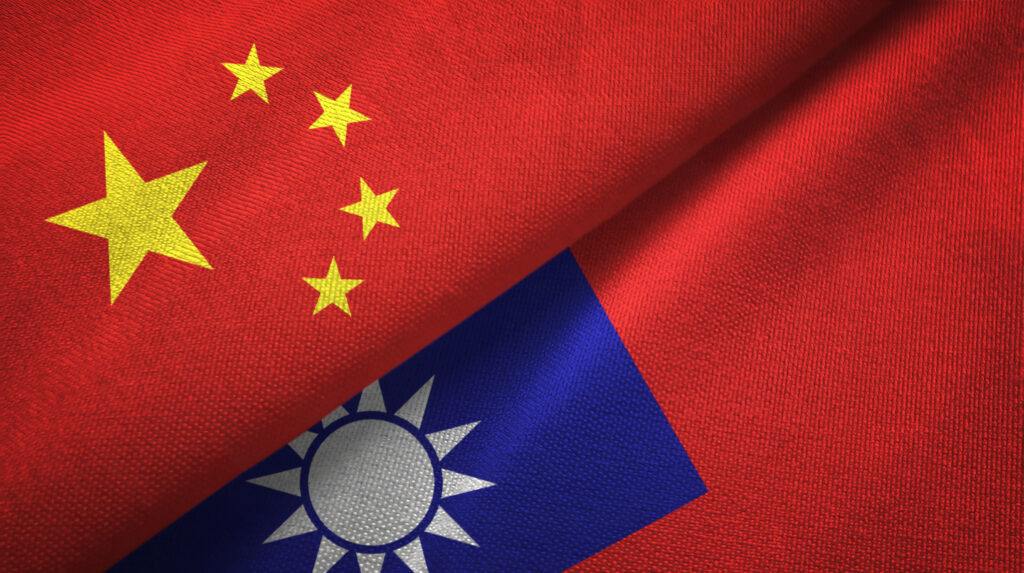I was in high school, in the mid-1980s when I found my father sitting at the desk in my parents’ bedroom, face in his hands, sobbing. “She almost made it here, she almost lived with us.” My father had just found out that his mother, in Nanjing, China, had just died of a heart attack. She was weeks from immigrating to the US to live with us. It was a long-awaited moment for my father. He had been separated from his mother for close to 40 years. It was the only time I’d ever seen my father cry. My father died almost 30 years ago but that moment of sorrow is forever etched in my memory. I recall with vivid detail, standing next to my dad and not knowing how to comfort him except to put my hand on his shoulder. I was young, but I knew the devastation of loss had visited him once again. He had lost his mother for a second time. The first time was in 1949 when he crossed the Taiwan Straits from China to Taiwan to visit his sister. During this visit, the Chinese Communists took control of China, so the doors back home were closed and he was to be separated from his parents for the next 30 years.
When I heard about the recent tensions between Taiwan and China and possible military action between these two entities, my heart sank, my stomach became nauseated. For decades, I witnessed the consequences of the 1949 civil war in China, when 2 million people retreated to Taiwan. Families were separated, children became refugees — families on either side of the Taiwan Straits were to know nothing about the fate of those who crossed to Taiwan or those who stayed in the mainland. There was no knowledge, no communications from China to Taiwan, or to the world for 31 years, from 1949 until 1980, when Deng Xiaoping reopened China. For all those years, my parents wondered about their parents, sisters, brothers, aunts and uncles. Were they alive? If they were, how had they survived? Did siblings marry and have children? It’s impossible for me to appreciate my parents’ strength and resilience against such uncertainty and loss. My maternal grandmother escaped to Taiwan with her 3 sons and daughter (my mother), but had to leave behind two other children whom she fretted about until the day she died, never knowing their fate, never knowing that she had 10 grandchildren who were born in her native Ganzhou, Jiangxi. On a family visit to mainland China a few years ago, my cousin told me about her mother, my mother’s older sister, my aunt 阿姨, who stayed behind in the mainland (because she had already married). My cousin recalled one particular day when she found her mother walking aimlessly in the rain, repeatedly asking about the welfare of her mother and siblings in Taiwan. My cousin held her hand and accompanied her in the rain. Not knowing about the welfare of her mother and siblings, and fretting about their survival, my aunt had suffered a mental breakdown and was incapacitated for years.
I understand the geopolitical challenges at hand. Independence for Taiwan. China’s reclaiming Taiwan as a renegade province. US and NATO’s view of Taiwan as a strategic block to China’s growing world power as well as a shining example of a living democracy in East Asia that counterposes the authoritarian state of China. The intellectual and democracy-oriented me is drawn into that dynamic. As powerful of a pull, however, is the re-earthing of the traumatic and life changing events that changed the lives of my parents and our family forever, stemming from the China-Taiwan tension some 70 years ago. An event that sparked the diaspora of over 2 million people in 1949.
My parents immigrated from Taiwan to the United States in the early 1970s, shortly after the Immigration Act of 1965. I find their audacious courage incomprehensible. It befuddles me how they had the wherewithal to pick up and move to a western country, across the world, facing uncertainty and risk, after already having suffered the loss of leaving their native homes decades earlier. Yet serendipitously, it was their American citizenship that enabled them to see their family as soon as China re-opened in 1980. My parents returned to their birthplaces in China to search for their family members. They had no idea what they would find — who had died, who had lived, and even if they were living, how had they survived these 30 years?
Growing up, I knew I had family in China but there wasn’t much more information than that. There were no pictures, no family heirlooms. There was a wall of silence and invisibility about my relatives’ existence. Not much was said, but I always felt my parents’ pain and incompleteness because a part of their family had gone missing. They knew nothing about the fate of their families in the mainland. My mother would talk about having an older brother and sister in the mainland, but my father hardly spoke a word about his family in China. The only relative I knew was his older sister, my aunt 姑媽, with whom he had grown up in Taiwan. As the years passed, I realized that the pain his family suffered during World War II was so severe that my father chose to keep it in his lockbox.
My parents were just teenagers when they became refugees to Taiwan. My father was 17 and my mother was 15. My mother’s family escaped from Jiangxi, China with what they could carry. As a wealthy family, they knew their fate would be sealed as the Communists moved into their area. My father left his hometown, Nanjing, during the summer of 1949 for a supposedly short visit to his sister who was living in Taiwan. Before he was to return home, his parents told him to stay put in Taiwan until the civil war and unrest settled down. Indeed, like many who left China, when my parents first settled in Taiwan with their families, they believed they would return to the mainland at some point. Neither of my parents ever believed they would become permanent refugees. Neither could fathom a separation from loved ones for 30 years.
Born in Taiwan, I belonged to the 外省人 waishengren (province outsider) category. I wasn’t “Taiwanese” because my family originated in the mainland. During my childhood, I knew there was tension between the Taiwanese and the waishengren but I didn’t know why. It was only in college that I learned that when the Kuomingtang Nationalist Party arrived in Taiwan in 1949 after retreating from China, they brutally took control of Taiwan, killing many of the Taiwanese intelligentsia and opposition. There was a sense that we waishengren weren’t really welcomed by the locals and that one day, the Kuomintang would return to the mainland and reinstate its authority there. So there I was with an “in limbo” identity that could not find a restful place of belonging in my early childhood.
As an immigrant family in the US, my parents kept a strong connection with relatives in Taiwan. We visited often. My father emphasized that no matter where we lived, we were never to forget our Chinese heritage. It was our duty to stay connected to the culture so we would be able to maintain meaningful ties with our relatives in Taiwan and eventually with those in China. Thus, language fluency and familiarity with Chinese etiquette were non-negotiable musts during my childhood. That cultural connection has remained central to my identity. In college, I majored in East Asian Studies with a focus on China. I lived in Taipei during my gap year after college, as I searched for my identity and family roots. During that year in Taipei, I studied Chinese, lived with my paternal aunt and uncle and befriended locals as well as students of Chinese heritage from around the world. I fell in love with Taiwan’s people, culture and society. The part of me that never felt fully accepted in the United States found a home in Taiwan. It was my heritage home. Even today, it’s the place I return to, to feel cradled in my cultural roots and embraced by familial comfort. My children, who are 17 and 20 years old, feel the same affinity to Taiwan. Their first language was Chinese. They’ve visited Taiwan on many occasions and also feel a deep sense of kinship and cultural belonging there.
At the same time, we are deeply and emotionally connected to mainland China. After all, it’s the place my people came from. Our roots go back there for goodness knows how long. It’s the place in which my parents were born. It’s home to the majority of my relatives. While I’m not as experientially connected to the mainland, I’m reminded of my father’s sense of duty that we remain connected to family there. They are family. They are family. There is nothing more sacred than family. Living in China are the descendants of my grandmother’s children, children whom she never saw and worried about everyday. They are the family my father yearned to see for 30 years.
So the thought of military tension between Taiwan and China brings up all the hurt, loss and suffering of my parents and the previous generation. Most of my relatives of that generation have passed away. As this turmoil ensues, who will remember the pain of war and separation on their behalf? How can we allow another generation of suffering? How can we allow more loss among families? Toward what end?
Two million people fled China in 1949, a diaspora that is rarely mentioned or addressed. The story of those people and their families and the ripple effect among millions more across generations is perhaps just a mere point of history to many, as the US and NATO strategize about the geopolitical implications of an independent Taiwan or an impending invasion from China. But history matters because human lives were affected. History must be remembered so we may learn and do better. The lives of those of the past– their joys, sorrows, loss and achievements — survive on through their descendants who remain with us today.
In honor of my parents, their parents, siblings and relatives who suffered so deeply during the last China-Taiwan tension; in honor of the many Taiwanese who lost their lives and freedom because of the Kuomintang takeover in 1949; in honor of all who lost decades of familial connection, of joy, love and communion — let us take a breath…to recognize that beyond the geopolitical aspects that are incredibly important, exists millions upon millions of people of Chinese and Taiwanese heritage around the world who are descendants of this unique diaspora. We are the legacy of that diaspora. We remember on behalf of those who have passed. May we do better, love better and peace better.














